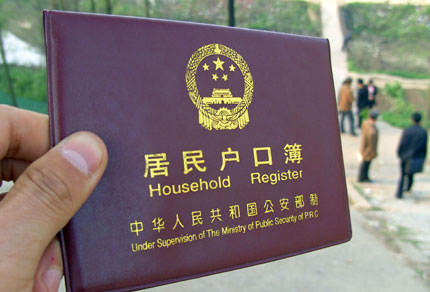By Wang Zhiyong
At a political consultative conference held on September 2 in Beijing, senior Chinese politician Sun Mingshan said the government should speed up reform of China's hukou (household registration) system.
 |
| A resident shows his Hukou booklet in this undated file photo. Hukou is basically a resident permit given by the government of China. It is issued on family basis. Every family have a Hukou booklet that records information about the family members, including name, birth date, relationship with each other, marriage status, address and your employer. |
Set up in 1958 to control a spontaneous mass migration to cities and prevent the formation of Latin-American style suburban slums, China's
hukou system has, over time, come to represent the division of the population into haves (urban households) and have not's (rural households).
Under the system, rural citizens who move to cities have little access to social welfare and public services such as education, medical care, and housing.
But on October 12, the Third Plenum of the 17th Party Congress declared that China has reached a stage in which the old rural-urban divide can begin to give way to a new pattern of combined development of urban and rural areas.
Hukou reforms trialed in some cities
In recent years, some cities in China have experimented with reforms to the hukou system.
October 1, 2008, Jiaxing City in east China's Zhejiang Province abolished the category of "agricultural households" and introduced a unified household registration.
On January 1, Yunnan Province announced the abolition of the distinction between agricultural and non-agricultural hukous.
Jiangxi Province also announced it was exploring the possibility of abolishing the rural-urban distinction in its registration system.
Hunan Province has also announced its intention to "promote a new type of urbanization," and free movement of the urban and rural populations.
Policy changes just cosmetic
But some experts believe the reforms carried out so far are cosmetic.
"Any loosening of the dual system is positive. Even the purely formal abolition of the distinction between urban and rural identity cards, is an important first step," said Professor Zhang Qianfan from Peking University.
But Professor Zhang pointed out that, even in areas that have carried out reform, discrimination still exists in social welfare, medicare and compulsory education. "Abolition of social welfare discrimination is far from being accomplished"
Shenzhen is a partial exception. On August 1 the city announced that temporary residents could send their children to local public schools and that 10-year permit holders would be included in the wider social security system. These changes will bring material benefits to the city's large migrant population.